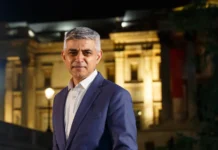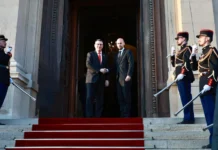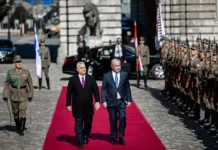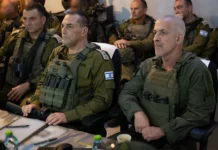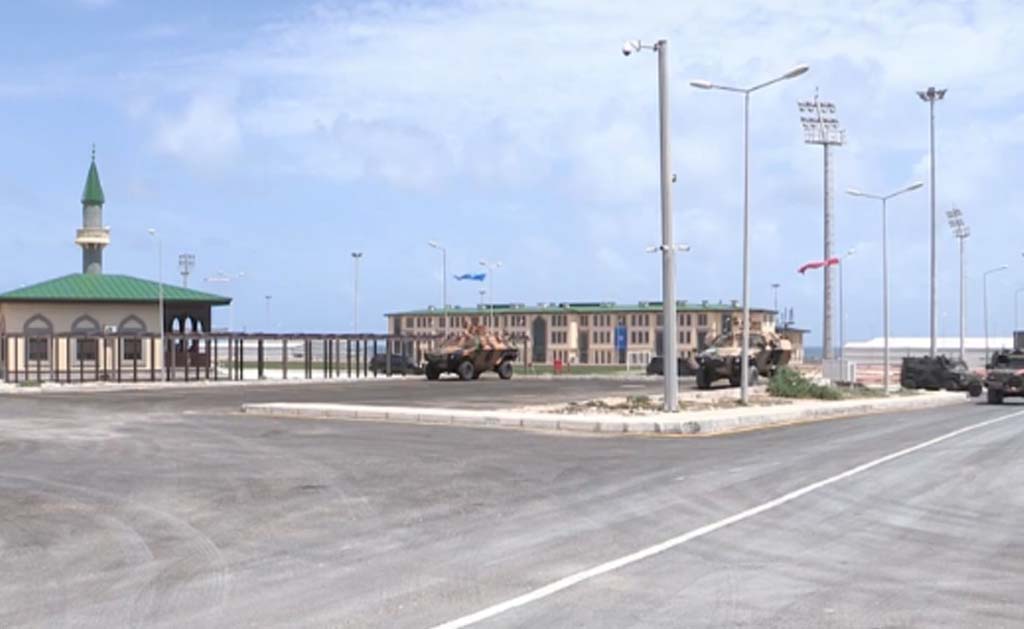Several seemingly unrelated events in various hotspots around the world may help with understanding the bigger picture of how terrorists organizations and state actors clear way for each other, further destabilize war-torn regions, and keep the counterterrorism alliances bogged down while they pursue their agendas.
Last weekend was quite bloody with deadly suicide bombings, which took place in Afghanistan, where the diplomatic area was hit killing dozens, Somalia, where a blast that killed 45 took place near the president’s residence and a hotel,and Yemen, where the attack targeted the Arab Coalition’s counterterrorism base in Aden.
Soon after, Houthis, armed with a swarm of drones, were able to take out UAE’s Patriot missile defense system in Central Yemen, a devastating blow that shows the level of sophisticated weaponry Houthis have access to.
A recent school raid in Nigeria left 110 girls unaccounted for, following a bomb in the fish market, which killed 19 people and injured 50. The US, which has approximately 6000 troops stationed across Africa, including Nigeria, Niger, Mali, Libya, Chad, and Mauritania, may be looking at scaling down its West African operations, which include joint trainings and counterterterrorism, after US troops faced a deadly ambush in Niger. Is terrorism succeeding?
In Iraq, Baghdad extended the punitive and destructive to Kurdish economy ban on commercial flights from and to Erbil for three months, despite recent talks that suggested that the ban would soon be lifted. At the same time, ISIS attacks in the previously Kurdish-held oil rich Kirkuk area, have been on the rise, just as additional evidence suggests that ISIS has plenty of cash stashed away in Iraq and abroad, and that rumors of its demise may have been exaggerated.
West Africa, meanwhile, may be getting some love from Turkey, as Erdogan sets out on a four-country tour to push Turkey’s influence. The countries include Algeria (which has political backing of both Iran and Saudi Arabia, and looks to gain Western political support vis-a-vis its Western-backed regional rival Morocco), Mauritania, a country known for horrendous human rights abuses, including slavery but which is a recipient of significant counterterrorism aid from both the United States and Saudi Arabia, Senegal, where Iran and Saudi Arabia are competing for influence, and Mali, where both the French and the US have been playing a significant role in counterterrorism operations.
What do all these seemingly unrelated developments have in common?
In all of the above, one can observe non-state terrorist organization destabilizing and attacking interests of allies that are looking to counter terror, as well as Iranian influence – and paving the way for state actors (Iran, Turkey, and Russia) to take advantage of the chaos and either strengthen their existing positions or to find new business and defense opportunities, that allow them to move into new territories some of which were traditional spheres of influence by other countries. Are these terrorist groups enjoying the funding of these same state actors? That is a question worth investigating, but for sure, their goals are aligned to some extent. For instance, the recent suicide attack against the Arab Coalition’s base had not only the physical effect of causing disruption, distraction, and destruction, but also makes primarily the Saudis look bad, even though in this instance it was clearly a terrorist attack.
The thought in the minds of many is that they they have no business in Yemen, and are inviting additional terrorist attacks by the very fact of meddling in another country. Have all these terrorist attacks been coordinated on some level? Likewise there is no answer, but what is clear is that there is a pattern, and that the terrorist organizations have recently intensified attacks in a way that puts pressure on their beleaguered opponents. The costs of running counterterrorism operations in Africa for the US are being questioned by President Trump’s base; after all, the continent is far away, the local terrorist groups seem disinterested in proliferating externally and thus do not provide a direct and immediate threat to the United States, and the loss of lives by US troops in an unfamiliar terrain is reminiscent of many poorly planned and failed operations in the past.
Continuous attacks in Afghanistan, after 16 years and multiple revised strategies, invites the same kind of reexamination of priorities. Whether the terrorists attacking the Arab Coalition base in Yemen are driven by the same calculus is unclear; but the attacks are exhausting and demoralizing, and with the Arab Coalition facing multiple threats while having little open support from the West, this strategy may take its toll. The main beneficiary, here, however is Iran, as these terrorist attacks clear the path for its dominance. The international community is not primarily blaming Iran for the horrific bloodbath in Yemen; rather, that talking point is dismissed because it is made primarily by the US and the Arab Coalition. While the Coalition is dealing with the aftermath of a terrorist attack, and the Saudi-backed Yemeni forces find themselves in a tough position of explaining why they are failing to defend the population, the Houthis strike a blow to the prestige of the coalition (and practically speaking – to its defenses) through a sophisticated drone attack. Where would Houthis get the drones? The growing complexity of these attacks leaves plenty of room to worry, especially when non-state actors are assisting with destabilization and weakening the Arab Coalition simultaneously.
In Iraq, an identical pattern emerges. Baghdad, coupled with Iran-backed militias, has successfully consolidated the control of Kirkuk area months ago, expropriating oil fields, and despite the indulgence of terrorists like Qassem Soleimani, continuing to receive backing from the United States. More recent news, that Hashd al-Shaabi and Lebanese Hizbullah now have control of US tanks, has not changed the calculus. US continues to back Iraq’s territorial integrity and envisions Kurdistan as part of the federal system, despite the excessive punitive measures Baghdad has taken up against the US ally and despite the fact, that all of these measures primarily benefit Iran. ISIS, meanwhile, has likewise been emboldened by the suppression of Kurds, launching multiple attacks against the Kurds, PMU, Hashd, and others in the area. ISIS, however, is still playing into the hands of Iran, despite having attacked Iranian interests. In reality, Iraqi destabilization through terrorist forces benefits Iran. It weakens the Kurds, it shows the need for Iranian presence to “stabilize” the area, it expends the resources of the United States and Western allies, and it creates an atmosphere of chaos and confusion that distracts from Iran’s path to hegemony.
For the same reason, increase in violence in Afghanistan benefits the state actor aggressors opposed to US interests. Taliban is going to the lengths that the US-backed Afghani government is simply unwilling and unable to go; furthermore, US is there only to provide auxilliary assistance – whereas Taliban is all in and receiving assistance, possibly from both Russia and Iran. Turkey and Qatar are both entangled, and with multiple state entities backing an increasingly brazen non-state movement, passivity is becoming less and less of an option if the US ever wants to reverse the loss in territory and the spike in violence from the past year. These developments also serve a propaganda purpose in showing the US and her allies as weak, disorganized, lacking in strategy, and not committed to fruitful and faithful alliances. What plays into the hands of these non-state actors, and the state actors that benefit off the fruit of their labors, is the Western dedication to “stability”, as opposed to clearly defined “decisive victory”. For that reason, asymmetrical warfare can simmer on for decades without any sign of improvement.
Where US shows passivity, fear, and lack of commitment, leaving her allies out to dry, its adversaries are showing opportunism and energy. With US signaling potential willingness to further minimize its involvement in West Africa after suicide bombings and ambushes against its personnel intensify, Turkey is jumping on board looking to take advantage of the power vacuum in several ways. First, it looks to take place of the security defense US is providing. Likely, the tour of the four West African countries will mirror Erdogan’s recent visit to Sudan, which culminated in the signing of a multitude of defense treaties, among other agreements. In West Africa, Erdogan is hoping to push the US out of its position, while providing a credible complement, if not alternative to the rivaling Saudi and Iranian influences. If it can displace the Saudis’ slipping grip on soft influence, it will only have to content with Iran in a bid for power.
His trips to Mali and Mauritania will be the first ever by a Turkish president; both countries are plagued by jihadist security concerns. Will Erdogan provide assistance in eliminating the jihadists or will he coopt them the same way he has coopted the Free Syrian Army, and assorted ISIS renegades? That remains to be seen, but given Erdogan’s proclivity for making dubious alliances with shadowy groups and incorporating them into his own power structure until such time as they backfire, we may see a shift not so much in the numbers of attacks, but in their targets. Thus far, the jihadist networks in Western Africa have operated on the basis of using kidnappings for ransom, assorted smuggling operations, and terrorist attacks to fund their activities, terrorize the population, and weaken the governments.
If Erdogan’s growing influence holds, we may see the attacks shift towards a deliberate strategy of attacking the interests of Erdogan’s rivals in the region and away from undermining the governments. The underlying assumption is that the terrorist groups, though irredentist, are also looking for stronger funders and backers, who will provide them with hunger in exchange for directing their activity towards equally “legitimate” but alternative targets. In essence, many of these groups are not purely ideological; they are a combination of criminal gangs with an Islamist political purpose. However, they do not necessarily have an overarching plan for a Caliphate, though that may be their nominal aspiration; they are not necessarily organized or equipped to govern, nor are they in a position or interested in providing social services for the population. In t hat, Al Shabaab, Boko Haram, and the like differ from the quasi-governmental bodies and movements, such as the Taliban, Hizbullah, and Hamas.
For that reason, they are easily cooptable by the highest bidder; operating in a climate of deeply-rooted corruption at the highest levels, it is possible that they have received payments from state actors in the region in the past to cause problems for the rivaling states. Somalia is another such place, where Turkey has been very active, making business deals, and acting as a credible influencer. In October 2017, Turkey set up its largest overseas base in Somalia. The army base illustrates Turkey’s efforts to increase its foothold along the Horn of Africa, pushing out Saudi Arabia. In January, Erdogan gave weapons to Somali soldiers. That these weapons may end up in the hands of the very terrorists, they are supposed to guard against is of no import. So long as Turkey is seen as a “legitimate” and helpful presence in the area, the optics are more important.
Al Shabaab has previously launched numerous attacks against Turkish interests; either Turkey will prevail through sheer expansion, or it will look to coopt the terrorists; it is unlikely to engage in direct confrontations, because despite the proliferation of terrorist groups, Turkey’s purpose in Africa is long-term and strategic, aimed at geopolitical influence, rather than merely shutting down the jihadist threats to its businesses. As with other countries, Turkey is combining hard power with soft influence by building schools and hospitals, investing in infrastructure, and providing scholarships for students to study in Turkish institutions. It seeks to counter jihadist influence by engaging the population in Turkish state institutions. The terrorists are an inconvenience, but they play the important part of deterring others and pressuring the US and the Saudis who are either completely uninvolved with anything other than counterterrorism operations or have been losing in the influence war.
While terrorism causes no end of headaches for the United States and Western and Arab allies, it plays an important multifaceted purpose to aggressive state actors looking to move in or increase their influence.
Terrorist proliferation has given Iran, Turkey, Qatar, and Russia justifications for engaging in far more extensive defense and security alliances with the governments of these countries, which were previously under influence of other states.
They have been used as a vanguard to either clearing the way for the state actors and their military and business interests, or to sow chaos and pressure the rivals of these actors away and out of these regions, both through expenditure of resources and human costs, and through weakening morale, creating distractions from addressing more global threats, and damaging their reputations among both the locals and the international community.
Finally, they have a potential for being coopted and integrated into a larger strategy of hard and soft influence in Africa and the Middle East.
Terrorism and geopolitical ambitions of state actors go hand in hand, and for that reason, despite the lip service countries like Iran, Turkey, and Russia, pay to the War on Terrror, in reality terrorist groups of all stripes are funded, tolerated, or are otherwise inextricably linked to the presences of these states in hot spots around the world.

